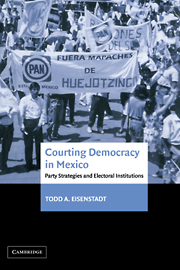Crossref Citations
This Book has been
cited by the following publications. This list is generated based on data provided by Crossref.
Lehoucq, Fabrice
Negretto, Gabriel L.
Aparicio, Francisco Javier
Nacif, Benito
and
Benton, Allyson
2005.
Political Institutions, Policymaking Processes, and Policy Outcomes in Mexico.
SSRN Electronic Journal,
De Remes, Alain
2006.
Democratization and Dispersion of Power: New Scenarios In Mexican Federalism.
Mexican Studies/Estudios Mexicanos,
Vol. 22,
Issue. 1,
p.
175.
Langston, Joy
2007.
The PRI's 2006 Electoral Debacle.
PS: Political Science & Politics,
Vol. 40,
Issue. 1,
p.
21.
Eisenstadt, Todd A.
2007.
The Origins and Rationality of the “Legal versus
Legitimate” Dichotomy Invoked in Mexico's 2006 Post-Electoral
Conflict.
PS: Political Science & Politics,
Vol. 40,
Issue. 1,
p.
39.
Greene, Kenneth F.
2008.
Dominant Party Strategy and Democratization.
American Journal of Political Science,
Vol. 52,
Issue. 1,
p.
16.
Icaza, Rosalba
Newell, Peter
and
Saguier, Marcelo
2009.
Democratising Trade Politics in the Americas: Insights from the Women's, Environmental and Labour Movements.
IDS Working Papers,
Vol. 2009,
Issue. 328,
p.
01.
Levitsky, Steven
and
Murillo, María Victoria
2009.
Variation in Institutional Strength.
Annual Review of Political Science,
Vol. 12,
Issue. 1,
p.
115.
Gandhi, Jennifer
and
Lust-Okar, Ellen
2009.
Elections Under Authoritarianism.
Annual Review of Political Science,
Vol. 12,
Issue. 1,
p.
403.
Magaloni, Beatriz
and
Kricheli, Ruth
2010.
Political Order and One-Party Rule.
Annual Review of Political Science,
Vol. 13,
Issue. 1,
p.
123.
Schatz, Sara
2011.
Murder and Politics in Mexico.
Vol. 10,
Issue. ,
p.
23.
Schatz, Sara
2011.
Murder and Politics in Mexico.
Vol. 10,
Issue. ,
p.
177.
Schatz, Sara
2011.
Murder and Politics in Mexico.
Vol. 10,
Issue. ,
p.
7.
Schatz, Sara
2011.
Murder and Politics in Mexico.
Vol. 10,
Issue. ,
p.
143.
Schatz, Sara
2011.
Murder and Politics in Mexico.
Vol. 10,
Issue. ,
p.
115.
Trejo, Guillermo
2014.
The Ballot and the Street: An Electoral Theory of Social Protest in Autocracies.
Perspectives on Politics,
Vol. 12,
Issue. 2,
p.
332.
Golosov, Grigorii V.
2014.
Authoritarian Electoral Engineering and its Limits: A Curious Case of the Imperiali Highest Averages Method in Russia.
Europe-Asia Studies,
Vol. 66,
Issue. 10,
p.
1611.
Lara Otaola, Miguel Ángel
and
Saavedra Herrera, Camilo Emiliano
2015.
Das politische System Mexikos.
p.
249.
Lankina, Tomila
and
Voznaya, Alisa
2015.
New Data on Protest Trends in Russia's Regions.
Europe-Asia Studies,
Vol. 67,
Issue. 2,
p.
327.
Torres, Antonio Faustino
2015.
El Instituto Federal Electoral y los claroscuros de su diseño institucional, 1990-2008.
Estudios Políticos,
Vol. 35,
Issue. ,
p.
129.
Haggard, Stephan
and
Kaufman, Robert R.
2016.
Democratization During the Third Wave.
Annual Review of Political Science,
Vol. 19,
Issue. 1,
p.
125.





